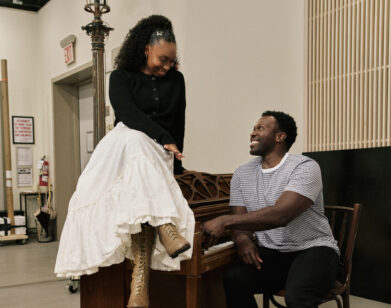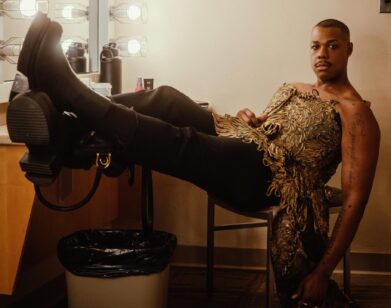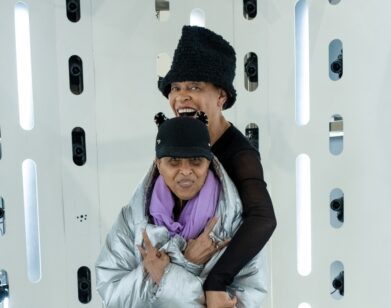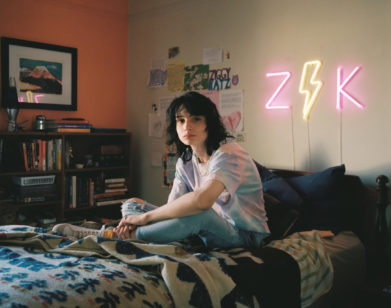BACKSTAGE
Adam Guettel Tells Jesse Eisenberg How He Wrote the Season’s Most Ambitious Musical
About ten years ago, a reporter asked Jesse Eisenberg what musical he’d most like to see revived for a Broadway stage. His answer? Floyd Collins, a somewhat obscure but fiercely beloved show about an explorer, the titular Floyd Collins, who’s trapped 200 feet underground in a cave. Fast forward a decade and Eisenberg’s wish came true: for the first time since 1996, when Floyd Collins ran for three weeks at Playwrights Horizons, the show—with a book by Tina Landau and music and lyrics by Adam Guettel, the grandson of the legendary composer Richard Rodgers—is receiving a long-overdue Broadway facelift courtesy of Lincoln Center Theater. And while the story of a small but tight-knit community in 1920s Kentucky might not seem like typical Broadway fodder, this new production, helmed by the Tony Award-nominated Jeremy Jordan, manages to soar well past the claustrophobic confines of its plot. “My grandfather’s work as a composer in this business has afforded me enough money to choose weird topics, to take the amount of time I think it takes to complete them, to wait for the right people and the right situations in the right theaters to get them on,” Guettel told Eisenberg earlier this month when the two got together to discuss commercial pressures, southern vernaculars, and the musical theater bug.
———
JESSE EISENBERG: I know the show started two minutes ago, but what is your process like during previews? Are you going up and watching it?
ADAM GUETTEL: I watch it probably more infrequently than people might imagine, because I do need a good amount of remove to go back in and have something helpful to add if there’s anything to be said. My rods get exhausted and my cilia in my ears get flattened.
EISENBERG: I see. So you take, what, every other show off, or something like that?
GUETTEL: Yeah, about that.
EISENBERG: I thought that I might be interviewing you, so I saw it as soon as possible and I just adored it so much. It’s an unbelievably bravura production. It’s unbelievably extravagant in all the right ways. It really serves your material with the most unlimited imagination that could possibly exist. Are you elated by the production?
GUETTEL: That speaks to the kind of mind you have. I’m very relieved to hear you say that, and it was lovely for you to write to me about it. At this point in the process, one is so raw and exposed, so to know that it has reached someone basically in the way that we intended to is reassuring.
EISENBERG: I really am way in over my head in terms of interviewing you as a musician or as a composer.
GUETTEL: Hardly, hardly.
EISENBERG: Asking more as a fan, it seems like there’s been this hidden gem that everybody who likes musical theater knows about, and it has never gotten its public due. It had a great production at Playwrights Horizons, but if you’re somebody of my age, you’ve never seen that, so it just feels like it’s been this thing that’s been lingering in the background of musical theater, waiting to be celebrated in the way it currently is at Lincoln Center. Is that how you feel too?
GUETTEL: Well, it’s bipartite because I have always hoped it could be done in a first-class production. It was only on in New York 28 or 29 years ago for 26 performances, and we’ve always said no to productions because we wanted to work on it and complete it and change it and make it what we think it should be. It’s very precarious and fraught if you start to operate on a patient whose anatomy you’ve completely forgotten. When you make something from scratch, there are thousands of decisions represented there, but you can’t possibly remember why you made them or how they connect to each other, so you go back in and hack away and you’re going to kill the patient. So we were very careful in our approach.
EISENBERG: It’s a wonderful performance by Jeremy Jordan. I had just seen him in The Great Gatsby and I just love the way he was really able to bring humor and this kind of casual wisdom. Could I just maybe rewind, though? Because the way you and I met is quite unusual…
GUETTEL: Let’s do it.
EISENBERG: So I tried to find it before talking to you today, but I think the web page expired. In 2015, I was doing a play and I did an interview—I think it was with City Center or something—and they asked me what play I would want to see, because City Center is known for reviving musicals. And I said that, for everybody I know who likes musical theater, their favorite show and their favorite album is Floyd Collins. But I also commented on one song I thought you should pull out. I said that, of course, never thinking that the person who wrote the show would ever read it, in the same way people who write that I’m ugly and shouldn’t be in movies never think that I’m going to read that either.
GUETTEL: [Laughs]
EISENBERG: But nonetheless, then I met a guy named Obi Abili, this wonderful actor, on the street. And at some point soon into our relationship, I had mentioned that I was a big fan of yours and he said he knew you. He agreed to introduce us to each other and I showed up a little early. You were already there. The first thing you said to me was, “I read your interview and don’t worry about saying that—”
GUETTEL: I think I said I agree.
EISENBERG: Yeah, you did.
GUETTEL: And I know exactly what you meant by that, and I appreciated that. It gave great value and veracity and spine to any of the compliments.
EISENBERG: Oh, that’s sweet. Well, if I could just apologize and also say that the new staging of the song justifies its existence and is wonderfully performed.
GUETTEL: You’re writing a musical, right?
EISENBERG: Yeah. I’m currently directing a movie that I wrote. It’s about a very shy woman in the suburbs, played by Julianne Moore, who joins a community theater that’s run almost like a cult by this director, played by Paul Giamatti. They’re putting on a show called Nosy Neighbors, which I wrote.
GUETTEL: That is absolutely wonderful.
EISENBERG: So the idea is that they’re doing this show that’s stuck in time a little bit, but all the actors in the musical are amazing Broadway actors. And I’m in it. It gave me an opportunity to sing and dance. I have a duet with Lilly Cooper and Bonnie Jean Milligan, there’s Colton Ryan, Halle Bailey, Bernadette Peters.
GUETTEL: Oh, rad. This is going to be so good. And you wrote all the music and all the lyrics.
EISENBERG: Yeah, it’s been a joy for me. And then I have the people from Hamilton orchestrating it, and our choreographer is Andy Blankenbuehler, so I’m working with the top people on quite a silly show.
GUETTEL: You absolutely are.
EISENBERG: So the humor is in kind of juxtaposing this musical that’s stuck in time with this woman who’s taking it very, very seriously. So the show has to be good enough, but also campy. This is basically my love of musical theater finding a way to come out in something I do, because I’m not talented enough to actually put out a musical.
GUETTEL: Well, listen, this is a wonderful, fun idea. Have you written any other shows?
EISENBERG: Yeah. I wrote a musical, goodness, maybe 15 years ago. It was called Me Time, and it was a three-character musical. It was trying to be satirical, it was trying to take musicals that I’d seen growing up—musicals like I Love You, You’re Perfect, Now Change—that are set in versions of a “city,” with people self-indulgently thinking about their foibles as these great, humorous, and dramatic stories in the city. And to me, they just feel very light and silly. The director was Alex Timbers and we did several workshops. And then I was like, “Oh, yeah, I’m not good enough to do this.” But I try everything, every form of story and fiction and play and music that I could write. So I realized that was not my path, but I love it so much.
GUETTEL: Well, like any American boy in the ’80s, I thought, “Well, I could be an actor because if you’re decent looking and you’re smart, you should be able to be an actor.” And I was so bad, but I sang well. At one point I was 17, just like Rolf in The Sound of Music. I came in to audition for Rolf, who sings “Sixteen Going on Seventeen,” and I was young and dewy. I was the grandson of the composer, Richard Rogers. The director, Jay Harnick, and his wife, Barbara Berry, were my parents’ best friends.
EISENBERG: Oh, wow.
GUETTEL: I sang really, really well. And then I did a scene, and Jay did his famous thing, like, “Hooray!”
EISENBERG: Oh, wow.
GUETTEL: “He’s doing a terminal cancer patient.”
EISENBERG: Oh my god.
GUETTEL: That’s how bad I was. I don’t know if you feel this way, but getting lots of good feedback in our industry is not necessarily to be trusted because the audience is going to be your friend and your enemy, and they’re all going to tell you if they like it.
EISENBERG: You’re exactly right.
GUETTEL: You really have to rely on your own sense of what works and what’s good, what’s worth people’s time. And I love cutting. I don’t have any sense of indignation or sorrow or despair when something gets cut. If a song isn’t good enough or if it’s not really working and the show will improve without it, my god, get rid of it.
EISENBERG: Really? Are you thinking that way even late into the game?
GUETTEL: We even thought about it with this production of Floyd Collins, which originated almost 30 years ago. We have made some real improvements there to make it less obstructively idiomatic. When you’re 27, every single idiom that people might’ve said down in Barren County, Kentucky in 1925—
EISENBERG: Was in there.
GUETTEL: “Cold as a witch’s tit” or “Sweet as rhubarb pie,” all of those things. And ultimately, we want people to join with our principles, join with the people who carry this story and identify with them. I think that it has to do with exoticism and novelty. When an exotic culture—let’s say on the Upper West Side of New York, for instance, or in a village like Appalachia—starts to first disseminate into the cozy areas of the northeast, it’s still exotic, it’s still novel. But what one realizes is that, just like anything about AA or alcoholism, the novelty is gone. It’s not exotic anymore. So any identifying references to that different kind of culture, the different way they speak, if it’s just there to identify them as different—there’s no special tingly, magic, novelty dust, and the audience, they feel written down to.
EISENBERG: Of course. It’s something that you can probably unconsciously sense rather than pick out explicitly.
GUETTEL: When you wrote A Real Pain, was it mostly performed as it was written?
EISENBERG: Oh, yeah. There was no improv. Kieran [Culkin] wouldn’t stand where I told him to stand, but that was the extent of his improvisation. He was so brilliant in the role that you just thought, “Whatever he’s going to do, the camera should just follow him because he’s so brilliant live.”
GUETTEL: He’s hated by cinematographers worldwide.
EISENBERG: Our cinematographer had just shot a movie called EO, which was about a donkey, which was a really well-received movie, and he said it was harder to follow Kieran around than the donkey. But no, Kieran was great. As a writer, my background is more in playwriting, and as you know, the actors don’t change the lines in plays because most playwrights are dead. So I feel the same with movies. I’m writing something pretty specific, and I’m trying to write about themes in ways that are not exactly stated explicitly but come through more subtly through dialogue. So I don’t want things to change because the words are usually chosen.
GUETTEL: Right. With something like Floyd Collins, there are lots of sections where, let’s say at the end of a measure, there’s four 16th notes. The last is tied over the measure line to the first 16th of the next measure to create a kind of ellipsis or specificity.
EISENBERG: Of course.
GUETTEL: And that is done deliberately. It looks like hell on the page. People go, “What the fuck is this?” Then they slowly realize that what I’m trying to do is give them something that won’t conform to some sort of stereotype. If I were to write a country shuffle at the top where I write, “Troubled, insecure guy of the age of 26 after first date, just do what you want, here’s the lines,” it’s a blueprint. I don’t write blueprints, but I know that some people very effectively do.
EISENBERG: Really? Because in movies it’s quite common. Normally, you’re trying to get a star to finance your movie, and usually that star wants changes, and usually that star has power over the writer who’s sitting quietly in the corner, and people are too scared to ask the star to not change the thing.
GUETTEL: People sometimes shave off the corners and they approximate. I generally try to help them not do that, and eventually they don’t. But it’s tempting for people to shave things off or sometimes even step out and above the appropriate emotional scale of writing. A lot of times, even in a big theater, we all have to make sure that we’re not begging the audience for attention, that we’re setting things up so that they keep leaning into us, that there’s a thread that draws them through the story as opposed to intermittent pockets of big, blustery energy that have a certain local glamour, but they don’t accrue.
EISENBERG: That’s a really sophisticated way to talk about the relationship between some project and an audience. But so many movies and also musicals, of course, don’t follow that rule. They love the moments of bombast that people walk out remembering, right?
GUETTEL: Yeah. And you can usually get away with, let’s say, one or two. It’s a private exchange if it’s working. Even though you’re sitting in an audience with 1,500 people, if you don’t feel like you are having a private experience, if that gets broken by someone stepping out of the emotional scale or really breaking the rules that the storytelling style set out, we begin to lose trust and interest because it becomes a vaudevillian contest of high notes and garish looks.
EISENBERG: So, how do you watch musicals?
GUETTEL: Very infrequently.
EISENBERG: Really? Do you just not go?
GUETTEL: I go, but I confess that sometimes I’m just not feeling good enough about my own work to feel small and irrelevant. But whenever I’m feeling pretty good, I go see lots of stuff. It’s just the shadows of the ego.
EISENBERG: I know. The last year of my life is the first time I started watching movies because I made a movie people liked. But before that, I just couldn’t see anything because I’m so mortified.
GUETTEL: It’s really good. If you’ll allow me just two minutes on this, it’s really quite touching and memorable and lovely, it’s beautifully raw and it builds. And that last scene is, of course, really some of the most beautiful editing, or non-editing, or non-acting, whatever it was.
EISENBERG: Oh, you’re so sweet to say that. Well, now you have another hit musical on, so maybe you’ll make it to Death Becomes Her.
GUETTEL: I really don’t know about “hit.” When we did Days of Wine and Roses, we did great off-Broadway. And then we were on Broadway, and we only ran for three months. You’re on the subway and you look over, someone’s got the New York Post or the news or whatever, and you’re absolutely sure that they’re reading a terrible review and they think you’re gross and pathetic.
EISENBERG: I think you got the most rave review I’ve ever seen in the New York Times for that show.
GUETTEL: That was a startlingly good review, but sadly ineffective as far as ticket sales.
EISENBERG: Oh, okay. Well, you’re doing something. And from a young age, even before I knew what sophistication meant versus mainstream, what I knew is that you are the emblem of sophisticated music in an industry that doesn’t often commercially celebrate that kind of thing.
GUETTEL: I would say, on one level, my grandfather’s work as a composer in this business has afforded me enough money to choose weird topics, to take the amount of time I think it takes to complete them, to wait for right people and the right situations in the right theaters to get them on. So on that level, there’s nothing heroic about anything that I’ve been forbearing about or continue to pursue. In other words, to do esoteric, weird topics in this industry might seem especially bushwhacky. But the fact is, I had the support to do it.
EISENBERG: Without that safety net or something, do you think you would be writing Diana: The Musical or something?
GUETTEL: I think I might’ve tried to become the kind of writer who makes money on Broadway. We can think of lots of them, and they are so good at it and I admire them so much. So if I didn’t have this support and the comfort of the money that I was given for my grandfather’s work, I think I would’ve certainly had to.
EISENBERG: Do you feel like you’re an extension of his work, which was really wonderfully complex, but also more accessible to an immediate listen?
GUETTEL: I wouldn’t presume that, but I would say that the more I work and the more I write, the more I admire what he did and also come to understand how finely wrought and calibrated and well-constructed it is, in particular his work with [Oscar] Hammerstein. Sometimes, I’m aware that I reach for the kind of simplicity that he was able to achieve naturally. And sometimes I pull it off and sometimes I don’t. So I wouldn’t say I’m an evolution, because I think that people want to remember melodies and the more they hear them in a show, the more they’ll remember them. And sometimes my shows are a little bit more through-composed, but I am learning to put in more repeats and stuff these days.
EISENBERG: Well, to me, as a fan, not as a person who thinks about music or theater, this is made just for us. Days of Wine and Roses is not going to be for a lot of people. But for the people it is for, it’s the thing that we would say is made for us.









